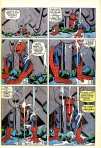Our good Internet friend plok recently posted an interesting discussion regarding Steve Ditko and objectivism, the controversial philosophy defined by the equally controversial Ayn Rand as “the concept of man as a heroic being, with his own happiness as the moral purpose of his life, with productive achievement as his noblest activity, and reason as his only absolute.”
While that particular worldview doesn’t quite with my own, I must admit a certain fascination toward Rand’s work because of the strong influence it plays on the work of Ditko, an artist and storyteller I greatly admire.
Traditional readings of Ditko’s work tend to laud his collaborations with Stan Lee on Spider-Man and Doctor Strange, nod appreciatively toward the artist’s super-hero, science-fiction and horror creations for Charlton and – if the commentator in question is feeling particular expansive – demonstrate some enthusiasm for such DC oddities as Hawk & Dove and Shade The Changing Man.
Yet Ditko’s beliefs, which were savagely parodied in such seminal comics publications as witzend, are just as much part of his art and legacy as any Big Two comic. The artist’s unshakable conviction as to what constitutes right and wrong and refusal to compromise his personal vision of “man as a heroic being” form the core of his most lauded stories.
If the rumors are true, Ditko envisioned Amazing Spider-Man #33 as the moment when Peter Parker literally broke the shackles of his neurosis and confusion to fulfill his heroic destiny. Some of theorized that Stan Lee’s reluctance to move the character in such a direction contributed to Ditko’s exit from Marvel and subsequent refusal to ever work on Spider-Man or Doctor Strange again.
Ditko’s beliefs truly came to the fore once he left Marvel. While The Question – an Objectivist gumshoe whose mask erased all facial features – is usually cited as one of his more potent mixes of super-heroics and philosophy, the artist’s mid-60s revamp of The Blue Beetle was every bit as much a mouthpiece for his creator as The Question and the even more extreme Mr. A.
In fact, I’d wager that fans of the bwa-ha-ha super-buddy Blue Beetle would scarsely recognize Ditko’s original – and far more idiosyncratic – conception of Ted Kord.
From Blue Beetle #5 (Charlton, November 1968), here’s “The Destroyer Of Heroes.” The plot and art are by Ditko with scripting by DC Glanzman and lettering by the ubiquitous “A. Machine.”
P.S. The story also features a certain investigative journalist named Vic Sage. You may have heard of the guy …























